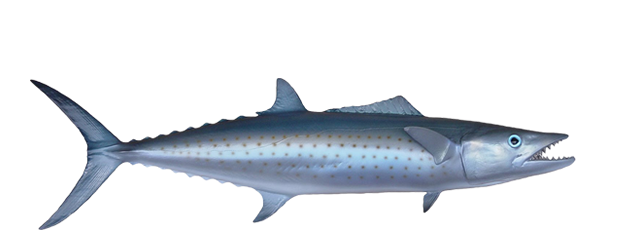Mackerel, Spanish

View Regulations

Scientific Name
Scomberomorus maculatus


Common Names
Sierra, Atlantic spanish mackerel


Description
The Spanish Mackerel resembles both the Cero and King Mackerel but can be distinguished from the two by its bluish body with yellowish spots and silver or dark green back. Other distinguishing features are the lack of scales on the pectoral fins and black first dorsal fin.


Habitat & Behaviour
The Spanish Mackerel can be found in open water but occasionally come inshore near reefs or vegetation. It is a highly migratory fish and fast for its size, covering a great deal of distance to maintain its preferred water temperature. They move north in the summer and south in the winter.


Natural Prey
Spanish Mackerel use specific techniques, forcing smaller fish into the middle of a large school of Mackerel while feeding. Their diet consists of smaller fish like mullet or anchovies in addition to cephalopods and shrimp.


Handling Tips
With the a very sharp teeth you definitely want to keep fingers away from its mouth. Larger ones you can gaff behind head or grab by tail and throw ‘em in, smaller ones net. Handle with a rag if you plan to keep them, if not don’t wipe slime off them. Grab behind the head with a wet rag (into the gills) pinch with index finger and thumb. If harvesting, good tip to completely cover in ice (don’t just lay on top of ice in cooler). Add ice to salt water – makes a brine – very cold – will freeze your fish (not hard) but firms the meat up nicely for easy filleting.

- Lucky Tackle Box
- Billfish Bounty in the Heart of the Mayan World – Guatemala
- The Best Species of Shark to Catch
- How to Catch a Shark: what equipment do you need?
- The Best Winter Fishing Spots in Texas






